Empanadillas are small savory turnovers similar to Latin American empanadas but with a rich olive oil crust. This version of Spanish empanadillas features paprika-spiced beef, sweet red peppers, and hard boiled eggs. Perfect as an afternoon pick-me-up, these savory hand pies are baked as an easy and nutritious twist on the classic fried treat.
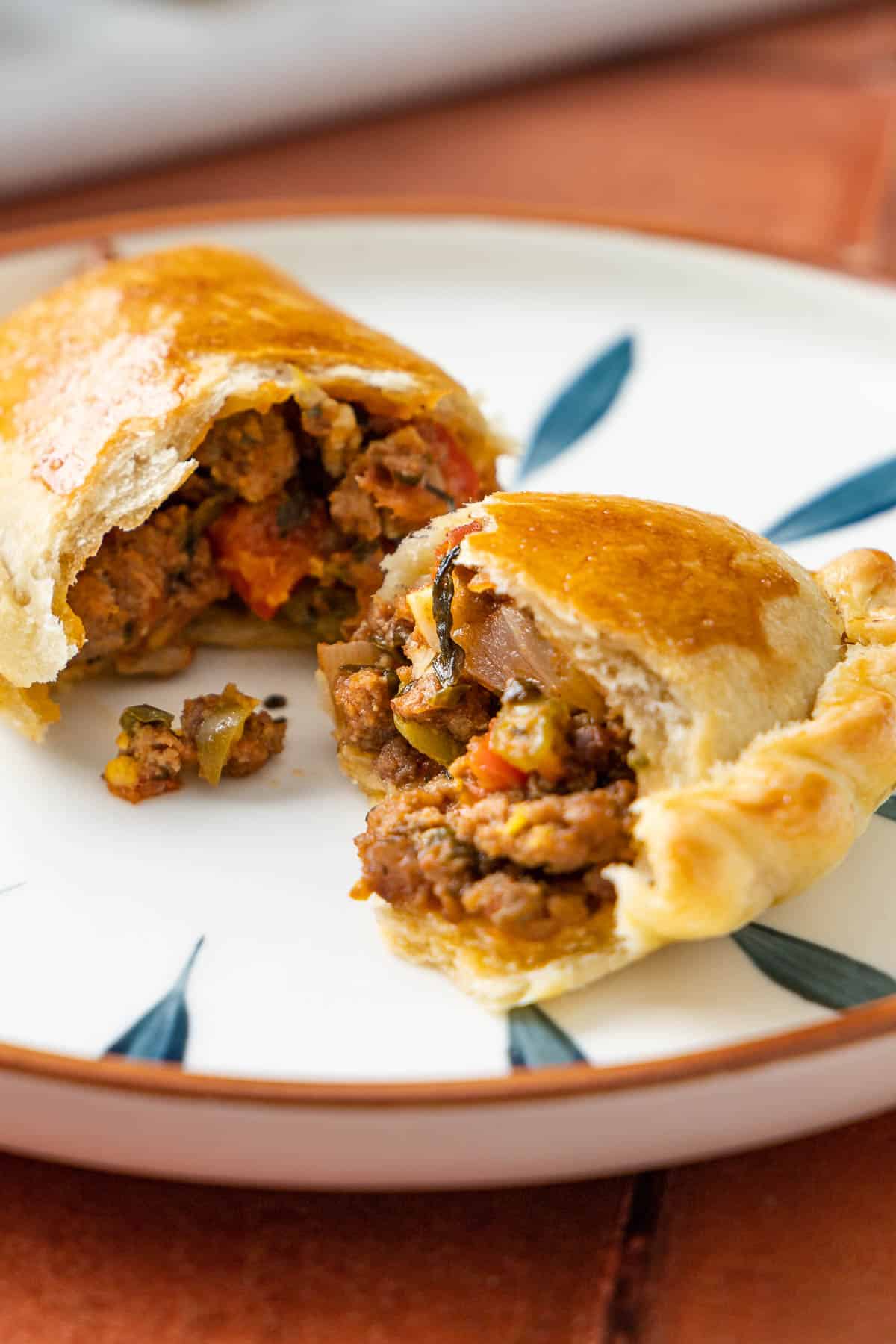
When I lived in Barcelona, I found that the merienda, or afternoon snack, was essential. It helped to carry me to a very late Spanish dinner (usually 9 or 10pm). I would visit a café near my apartment in the old city, where I could enjoy a coffee and merienda while people-watching in the square.
Empanadillas often called my name on the pastry shelf where they had freshly made treats. When my sweet tooth wasn’t calling for churros and Spanish hot chocolate or fig cake, I went savory with empanadillas. They were just the right size for a snack. And, if I was really hungry, I could sample many of the enticing fillings.
One of my favorite empanadilla fillings was ultra-savory ground beef spiced with smoky Spanish paprika. I’ve recreated them here, in a baked version that’s easy to make at home.
With 16 empanadillas, this recipe makes plenty for sharing. They’re especially welcome as part of a large tapas spread with sangria and patatas bravas and pan con tomate. You can even freeze them and pop them in the oven for an easy dinner on a busy day.
Table of Contents
Food Stories: Empanadillas vs. Empanadas
If you order an empanada in Spain, you may be surprised when a large slice of tuna pie shows up at your table. In Spain, empanada usually refers to a large savory pie, typically filled with tuna, baked in a slab or a round and sliced to serve. The suffix, “illa” implies that something is small, so empanadillas are single serving and hand-held, like Latin American empanadas.
While empanadas originate in Galicia on the Atlantic coast of Spain, many people in the U.S. are more familiar with Latin American empanadas. They were brought by the Spaniards to the Americas, where they incorporated local ingredients and tastes for countless new variations. One of the most notable differences between Spanish empanadillas and Latin American empanadas is the spices and flavorings used in the filling.
Spanish empanadillas get their sweet, smoky, and savory flavor from Spanish sweet paprika and sofrito, an aromatic base of sautéed onions and tomatoes. Spanish empanadillas are typically fried, but they can be baked instead, especially when prepared at home.
The ground beef filling in this recipe is a second favorite after the ubiquitous tuna empanadas.
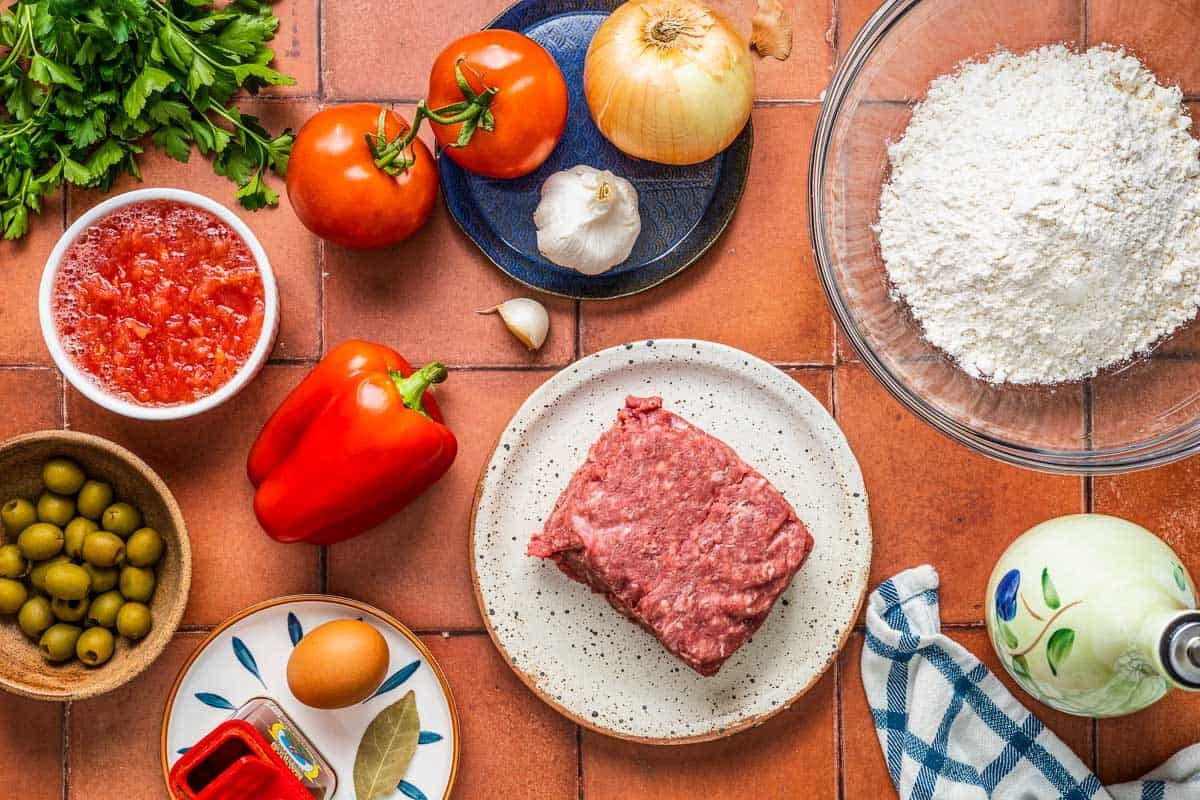
What You’ll Need to Make Empanadillas
Like many Spanish recipes, these beef empanadillas rely on sofrito as their flavor base. Sofrito typically starts with sautéed onions and tomatoes and can include peppers, garlic, herbs, and spices.
- Olive oil: Use extra virgin olive oil, preferably Spanish. The olive oil coats the flour to make a tender dough.
- Salt and pepper: Heighten the flavors of the other ingredients, with the pepper adding a subtle warmth.
- All-purpose flour: Create a tender dough strong enough to hold in the fillings.
- Onion: Use a milder, sweet onion like Spanish, Vidalia, or Walla Walla.
- Red bell pepper: The sweetness of chopped red bell pepper complements the beef and the paprika.
- Bay leaf: Piney bay leaf is subtle but essential for rounding out the flavor.
- Ground beef: Use lean ground beef.
- Sweet paprika: Spain is famous for its sweet and smoky paprika, or pimentón, produced in la Vera. I like sweet Spanish paprika for this recipe, but smoky would work as a substitute.
- Tomatoes: Grate fresh tomatoes on the coarse side of a grater. Use both the flesh and the juice, but discard the skin. Or, you can substitute with 1 cup of canned crushed tomatoes.
- Garlic: Spanish food almost always includes some garlic because it’s delicious.
- Fresh parsley: Fat-leaf parsley adds a bright and herbaceous aroma.
- Hard boiled egg: A traditional, but optional, addition to the filling. Eggs were used to enrich the filling and replace some of the beef. They’re a protein-rich food and historically cheaper than meat and seafood.
- Green olives: Add pops of brininess to the filling.
How to Make Beef Empanadillas
Empanadillas involve a bit of hands-on time. Plan for about 2 hours, but your work will be rewarded. With 16 empanadillas, this recipe makes plenty to share or save for later. I also find that sealing and crimping them can be meditative.
- Make the dough: Combine the olive oil, water, and salt, then gradually add in the flour, stirring with a wooden spoon. Once the dough comes together, switch to kneading by hand until the dough no longer sticks to your hands or the counter, 1 to 2 minutes. Let the dough rest, covered, while preparing the filling.
- Make the filling: In a large frying pan, heat the olive oil over medium heat until shimmering but not smoking. Add the onion, red pepper, and bay leaf and cook until they soften and begin to caramelize. Add the ground beef, salt, and paprika. Cook for 4 minutes, stirring to break up the beef, until browned. Add the tomatoes, reduce the heat to low, and cook for 8 to 10 minutes, until almost all the liquid has evaporated. Add the garlic and parsley and cook for 1 minute until fragrant. Take the pan off the heat and stir in the chopped hard-boiled egg and olives. Set aside until cool enough to handle.
- Shape and fill the dough: Divide the dough into 16 equal pieces. Working with one piece of dough at a time, use your palms to press each ball of dough into a circle about 5 inches in diameter. Add about 2 tablespoons of filling to the center of the dough.
- Fold and seal the empanadillas: Fold the dough over the filling and gently seal the edges with your fingers. Use your fingers to form the crimp by twisting and folding the edges together.
- Bake: Arrange the empanadillas on the lined baking sheets. Brush the top of each empanadilla with the egg wash. Bake for 20 minutes, or until golden brown, rotating the pans and switching shelves halfway through.
How to Store Empanadillas
Store leftover empanadillas in an airtight container in the refrigerator for up to 4 days. Reheat them at 350°F for about 15 minutes, or until warmed through. This retains the texture of the crust.
Beef empanadillas can also be frozen for up to 3 months either before baking, or after. In either case, freeze in a single layer on a sheet pan. Once frozen, transfer to a freezer bag or freezer-safe container.
For uncooked frozen empanadillas, bake from frozen at 400°F until cooked through, about 25-30 minutes. Rotate the pans and switch shelves halfway through baking
To reheat cooked frozen empanadillas, bake in a 350°F oven for 15 minutes.
Make it a Meal
Eat empanadillas as a snack turn it into a larger affair. Enjoy two of these mini hand pies with a fresh salad or a bowl of Spanish Gazpacho. Eating your meal while sipping wine and people watching in a townsquare is entirely optional!
More Scrumptious Spanish Recipes
Browse all Mediterranean recipes.
Visit Our Shop.
Spanish Extra Virgin Olive Oil
Add a peppery kick to your Empanadilla dough with our Hojiblanca EVOO from Andalusia.

Spanish Beef Empanadillas
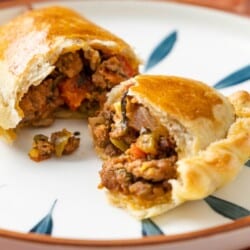
Ingredients
For the Dough:
- 1/2 cup extra virgin olive oil
- 1/2 cup tepid water
- 1/2 teaspoon kosher salt
- 3 cups (360g) all-purpose flour
For the Filling:
- 2 tablespoons extra virgin olive oil
- 1/2 large onion, diced
- 1 red bell pepper, diced
- 1 dried bay leaf
- 1/2 pound ground beef
- 3/4 teaspoon kosher salt
- Freshly ground black pepper
- 1 teaspoon sweet paprika
- 2 medium tomatoes, grated or finely diced
- 1 clove garlic, minced
- 2 tablespoons minced parsley leaves
- 1 hard boiled egg, diced (optional)
- 1/4 cup pitted green olives, chopped
For the Egg Wash:
- 1 large egg
- 1 tablespoon water
Instructions
- Make the dough: In a large bowl, whisk together the olive oil, water, and salt. Gradually add in the flour, one cup at a time, stirring with a wooden spoon. Add each addition after the previous is almost fully incorporated. Once all the flour is added, the mixture will seem clumpy. Scrape the dough onto a clean work surface and knead by hand until the dough comes together and no dry bits of flour remain, 1 to 2 minutes. The dough should be relatively smooth, malleable, and no longer stick to your hands or the counter. Transfer the dough back into the bowl, cover, and let rest while preparing the filling.
- Make the filling: In a large frying pan set over medium heat, add the olive oil. Once it is shimmering, but not smoking add the diced onion, diced red pepper, and bay leaf. Cook for 6 to 7 minutes, stirring occasionally with a wooden spoon, until softened and the vegetables begin to caramelize.
- Add the beef: Add the ground beef, salt, black pepper, and sweet paprika. Cook for 4 minutes, stirring to break up the beef, until browned.
- Add the tomatoes and reduce: Add the tomatoes and scrape the bottom of the pan with the wooden spoon to loosen the flavorful browned bits. Reduce the heat to low and cook for 8 to 10 minutes until almost all the liquid has evaporated.
- Finish the filling: Add the garlic and parsley and cook for 1 minute until fragrant. Take the pan off the heat and stir in the chopped, hard-boiled egg and olives. Set aside until cool enough to handle.
- Preheat the oven: Arrange oven racks in the upper and lower thirds of the oven and preheat to 400°F. Line two baking sheets with parchment paper.
- Assemble the empanadillas: Divide the dough into 16 equal pieces. Shape each piece into a sphere. Work with one piece of dough at a time and keep the others covered to prevent them from drying out. Use your palms to press each ball of dough into a circle about 5 inches in diameter, or use a rolling pin. Add about 2 tablespoons of filling to the center of the dough. Fold the dough over the filling and gently seal the edges with your fingers. Use your fingers to form the crimp by twisting and folding the edges together. Alternatively, use the tines of a fork to press and seal the edges together.
- Bake: Arrange the assembled empanadillas on the lined baking sheets, placing 8 on each sheet. In a small bowl, whisk the egg with a tablespoon of water. Use a pastry brush to brush the top of each empanadilla with the egg wash. Bake for 20 minutes, or until golden brown, rotating the pans and switching shelves halfway through.
Video
Notes
- Store leftover empanadillas in an airtight container in the refrigerator for up to 4 days. Reheat them at 350°F for about 15 minutes, or until warmed through. This retains the texture of the crust.
- Beef empanadillas can also be frozen for up to 3 months either before baking, or after. In either case, freeze in a single layer on a sheet pan. Once frozen, transfer to a freezer bag or freezer-safe container. For uncooked frozen empanadillas, bake from frozen at 400°F until cooked through, about 25-30 minutes. Rotate the pans and switch shelves halfway through baking. To reheat cooked frozen empanadillas, bake in a 350°F oven for 15 minutes.
- Visit our shop to browse quality Mediterranean ingredients including olive oils, honey, jams and spices.



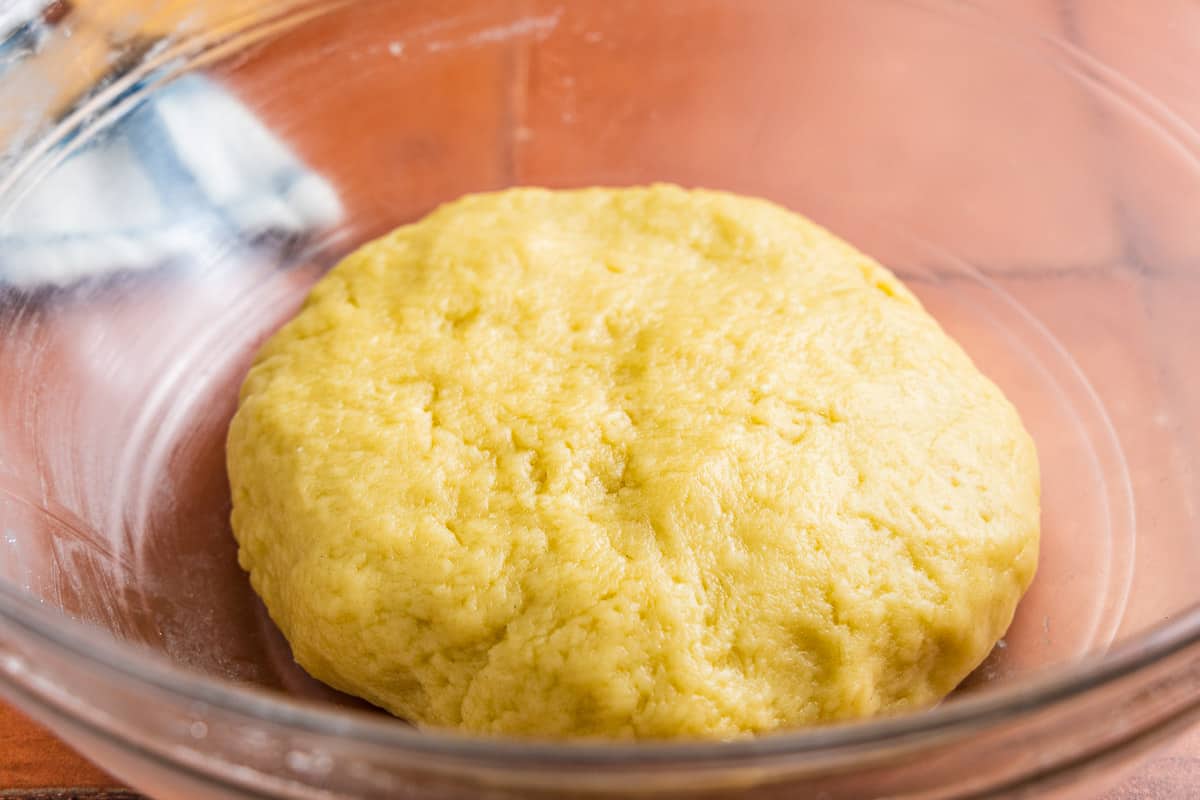
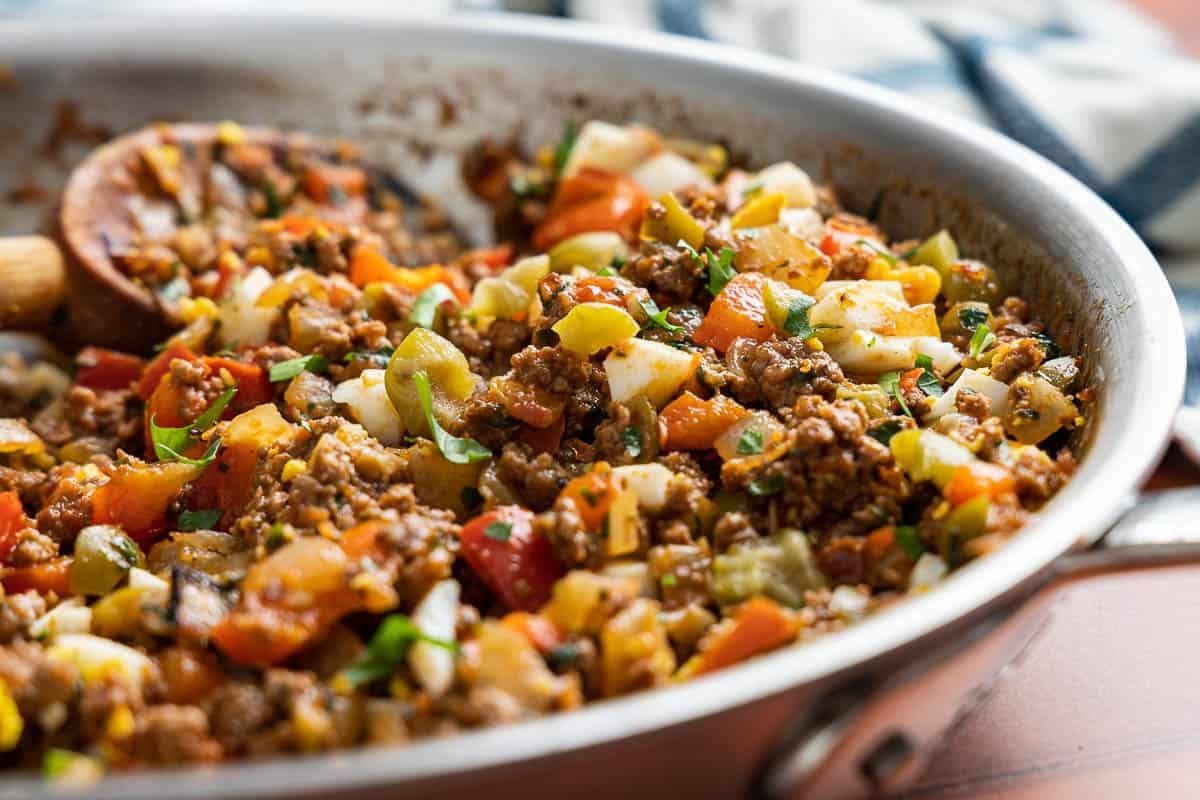
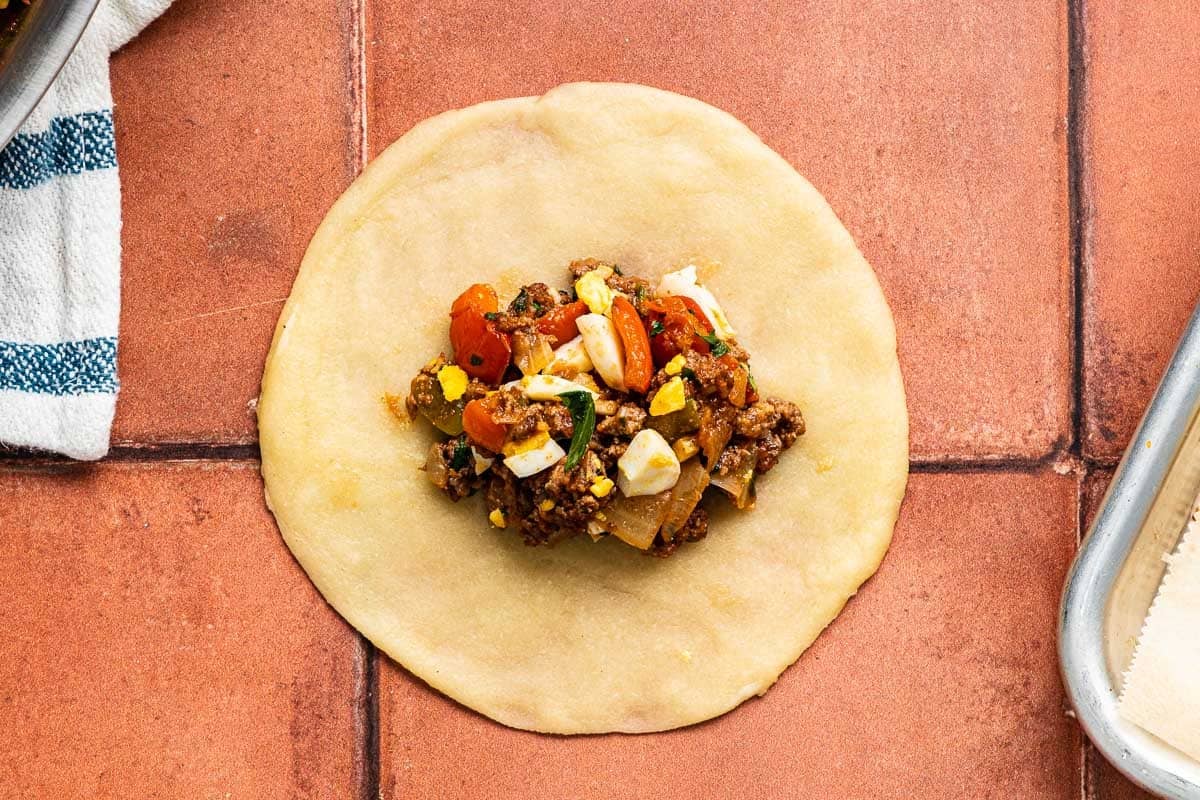
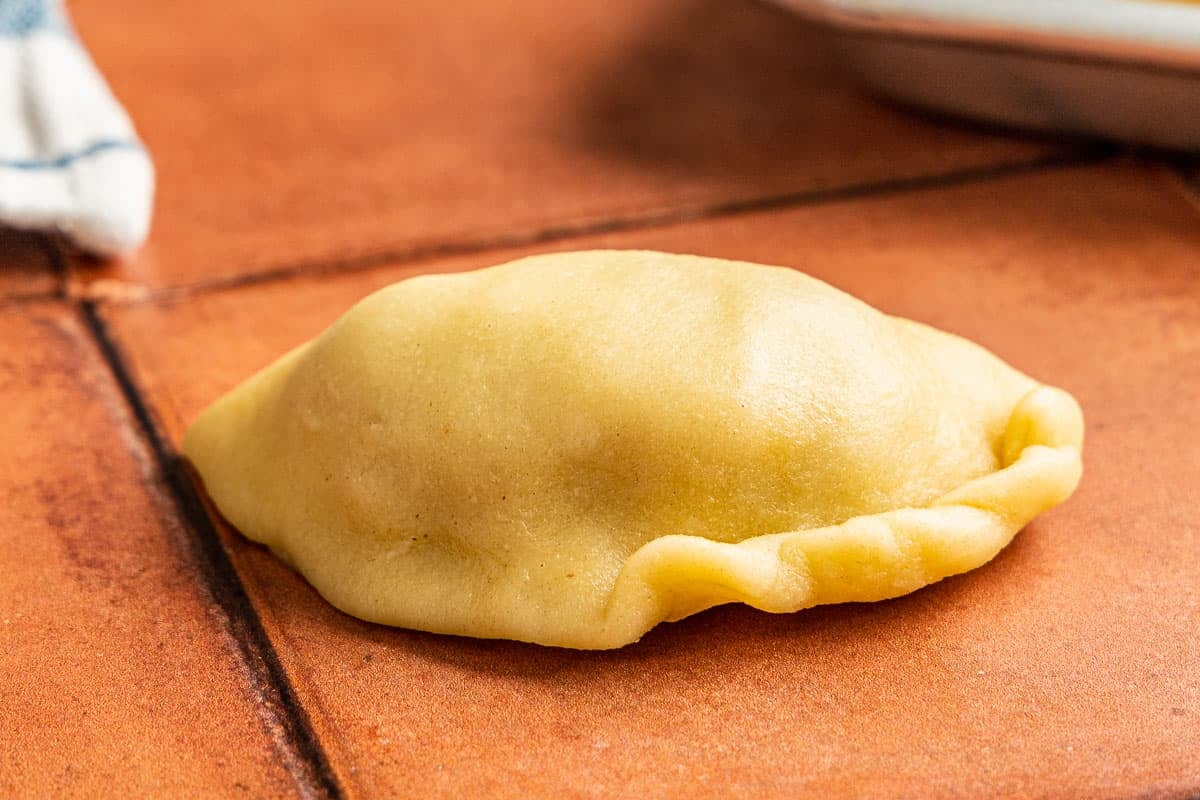
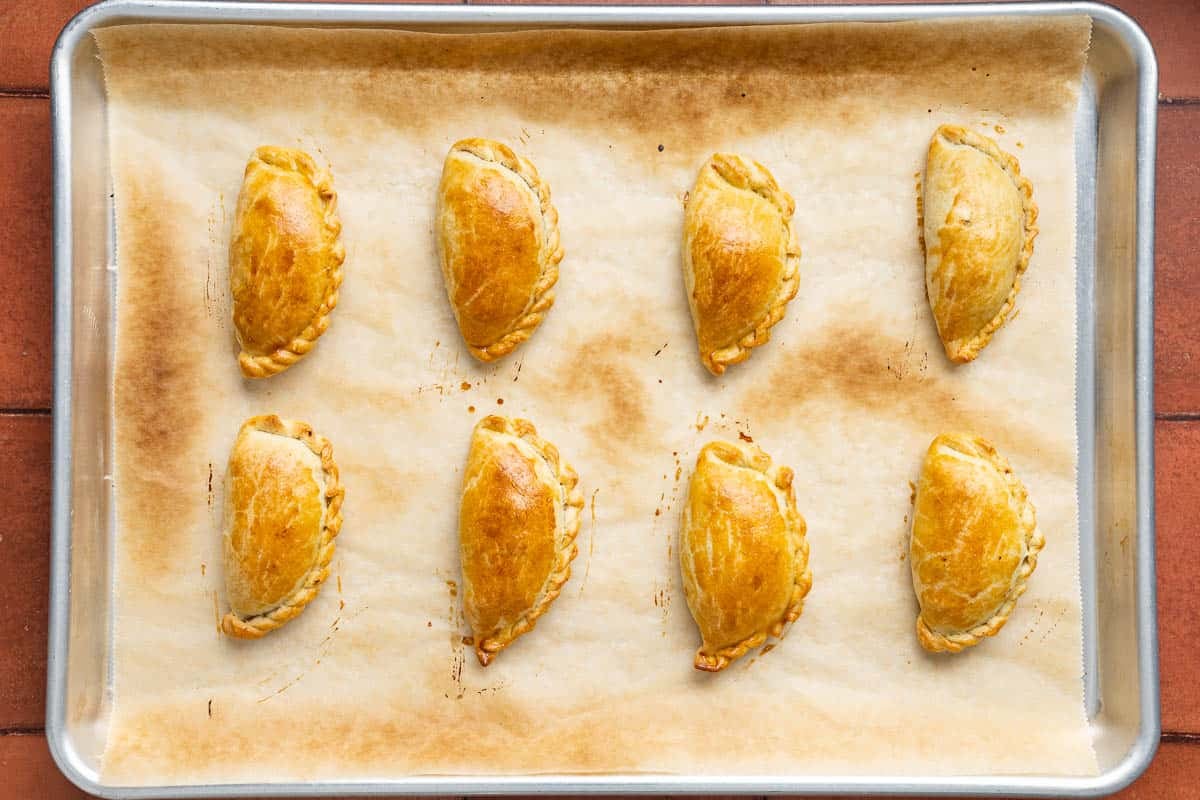

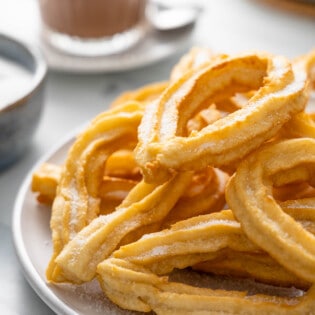


I love the filling, it was delicious and easy to make. I was disappointed with the crust, but can’t say if I possibly did something wrong. I followed the directions, but unlike crusts using butter, this olive oil crust was not flaky as I was expecting, and it could have used more flavor. But I used extra virgin olive oil, not the Spanish olive oil. Maybe that was the problem! Any tips on this would be appreciated. Thank you for the wonderful recipes!
Hi, Kristin. Any variety of EVOO works here, so the problem wouldn’t have been caused by using the Spanish one specifically. This is intended to be more tender and flavorful (dependent on the oil used) than a butter crust, but won’t be quite as flaky since the solid fat from the butter makes the layers – the water in the butter evaporates to steam in the oven which makes it flaky. There is a possibility that you may have also overworked the dough a bit.
I made these on the weekend and they were absolutely amazing! We hosted a Spanish themed dinner and served these as the appetizer.
I made them the night before and reheated as per the instructions in the recipe and they were amazing.
We served them with Pico De Galo and it paired wonderfully.
My dough was a little dry so I did add little bits of water to help moisten the dough and make it more workable. I also rolled out my circles a little bigger and allowed me enough excess to do the rope closure. They were pretty and delicious. Definitely making these again.
Only thing is it did take me about 2 hours to make. But the results were fabulous and worth the time and effort.
Thank you so much for taking the time to review, Sandra!
I made these empadadillas and we ate them as soon as they came out of the oven. They were delicious.
I would llike to know if I can make these the night before, cover them well & put them in the refrigerator and bake the following day?
Thank you.
Hello! Yes, that should be fine, Mabe :).
This was very tasty. I am horrible with dough, mine did not turn out very flaky at all but more dense. Do you think I may have overworked it or added too much flour? It was quite dry. I mixed some labneh with ras el hanout, salt, garlic and lemon juice and dipped the empanadillas in that. So much YUM. Thank you for this easy recipe. I will definitely make again and try to improve my dough skills. Hmmm.. could I use puff pastry?
Hi, Linda! This dough isn’t supposed to be flaky like pie dough so you may have actually made it correctly. Go You! However, without being in your kitchen its hard to say exactly what you could’ve done differently. I would just continue to experiment adjusting one variable at a time until you find what works. (You can really never have too many empanadillas lying around). To answer your question, this recipe could be made with puff pastry, it will expand more, take up more space, and be flakier and more buttery. You can also just use pie dough if you’re more comfortable with that. Also, the dip you made sounds AMAZING!
What can you substitute for vegetarian empanadas? Shrimp, fish?? Thanks.
Hi, Tama. Those would both be good options. Mushrooms and lentils may work as well :). Sounds like we need to work on a vegetarian empanadilla recipe to share :).
I’m new to freezing meals. I’m going to be having knee surgery and want to get some freezer meals made ahead of time. This sounds delicious!
Would this freeze well if I made it into one large pie rather than small ones?
Hi, Judy. Interesting question! It’s something we have not tried before, so it’s a bit hard to say how this would turn out. This idea reminds me of frozen pot pies, though. In theory, it may work. If you give it a go, we’d love to hear how it turned out for you!
My school (Albanian International School in Tirana) is having its annual international Day May 30 and my homeroom chose Argentina. I plan to make empanadas. Would this recipe be similar enough to Argentinian empanadas or should I swap out the filling for the Argentinian empanada filling?
Hello,
My partner would love these as he’s a big meat eater. How might I make this vegetarian for me?
Thanks!
I suggest that maybe replace the meat with mushrooms?
Great idea! Lentils might also be another option.
Could the dough be made with all purpose gluten free flour?
Hi, Pam. We have not tested this with gluten free dough, but it may work. If you give it a try, please stop back and share your thoughts.